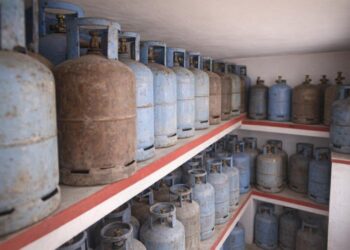Anatomy of a Neighborhood Complaint
In the winding streets of Mayanga, a fast-growing quarter of Brazzaville’s Madibou district, the staple click of a gas stove recently gave way to an unsettling silence. Residents recount bringing home 3.5-kilogram cylinders purchased from informal mini-depots only to discover them empty. Local radio first relayed the grievances in late April, and social networks swiftly amplified them (Radio Mucodec, 28 April 2024). While a handful of cases does not by itself confirm a pattern of fraud, the episode has reignited debate on how liquefied petroleum gas flows from licensed importers to household burners.
Supply-Chain Complexities in Congolese LPG
The Republic of the Congo imports most of its household LPG despite being an oil producer, because refining capacity is calibrated primarily for export-grade fuels. Bulk shipments arrive at the Pointe-Noire terminal and are trucked 510 kilometers to Brazzaville, where accredited wholesalers decant the product into various bottle sizes. Each logistical hand-off—importer to transporter, transporter to wholesaler, wholesaler to retailer—creates space for both inadvertent loss and opportunistic malpractice, especially where refrigeration and weighing equipment are scarce. Interviews with the Association des Distributeurs de Gaz du Congo indicate that mini-depots sometimes acquire cylinders through parallel sourcing when official stocks run low, a practice tolerated informally during seasonal peaks (ADGC communiqué, March 2024).
Regulatory Safeguards and Recent Reforms
Congolese law entrusts the Ministry of Hydrocarbons with certifying cylinders and sealing valves, yet enforcement budgets remain modest relative to the country’s 1.5 million urban users. In 2023 the ministry launched an electronic seal pilot program that embeds QR codes on 12-kg bottles; a 3.5-kg iteration is scheduled for the second half of 2024. Officials argue that digital traceability will deter tampering by allowing inspectors—and eventually consumers equipped with smartphones—to verify a cylinder’s last filling date and net weight (Ministry press briefing, 9 February 2024). Parallel to technical fixes, a draft decree under inter-ministerial review proposes stiffer fines for retailers found selling under-filled containers, but it also introduces a grace period for training small vendors rather than shuttering them outright, signaling a preference for compliance over coercion.
Voices from the Ground: Vendors and Users
At dawn in Mayanga’s central square, vendor Véronique Ngazoa stacks assorted cylinders beside sacks of cassava flour. She concedes that a tiny minority of retailers may “shortcut the weighing stage” to preserve margins when wholesale prices inch upward, yet she insists most rely on repeat customers and cannot afford reputational loss. Several buyers echo her view, portraying the empty-cylinder incidents as aberrations amplified by the echo chamber of social media. Still, consumer-rights advocate Jean-Benoît Oko calls for portable scales to become as ubiquitous as mobile-money terminals, so that buyers can verify weight on the spot. His proposal finds resonance among neighborhood associations that see transparency as a vector of civic trust rather than a frontal accusation.
Regional Context and Investor Confidence
Misgivings over retail practices arrive at a delicate juncture. The government is courting Gulf and Asian investors to expand the liquefaction unit at Pointe-Noire and to erect suburban storage hubs meant to shorten the distance between bulk reservoirs and end-users. Diplomatic observers note that investor appetite hinges partly on a predictable domestic off-take. By confronting retail inefficiencies, authorities aim to assure financiers that the local market can absorb larger volumes without leakage—literal or figurative. The swift dispatch of inspectors to Mayanga, combined with public guidance urging consumers to check valve seals before payment, projects an image of responsiveness without casting blame. As one senior official describes it, “We are tightening bolts in the value chain so that a household meal is never hostage to a faulty bottle.” For households like those in Mayanga, such assurances matter as much as structural upgrades: they transform an everyday inconvenience into a policy catalyst, reminding all stakeholders that the microscopic lens of neighborhood experience often shapes the macroscopic narrative of national reliability.











































